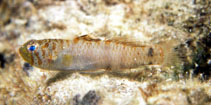| Family: |
Gobiidae (Gobies), subfamily: Gobiinae |
| Max. size: |
1.9 cm SL (male/unsexed) |
| Environment: |
reef-associated; marine; depth range 0 - 18 m |
| Distribution: |
Indo-Pacific: from the East African coast (Mozambique) and Seychelles, Aldabra, and Chagos; the East Indian region; southward to Australia; north to Japan and Micronesia (Palau, Guam, Northern Mariana Islands, Federated States of Micronesia, Marshall Islands, and Kiribati [Line Islands]), and east to French Polynesia (Society Islands). |
| Diagnosis: |
Dorsal spines (total): 7-7; Dorsal soft rays (total): 8-8; Anal spines: 1-1; Anal soft rays: 8-9. Characterized by semi-transparent, greenish-brown body with about six faint, internal dark bars; scale margins narrow orange-brown; short brown bars across top of head and along upper back; presence of dark internal blotches above anal fin and lower edge of caudal peduncle; upper portion of caudal peduncle with large black spot; eleventh to fifteenth pectoral rays usually branched; ctenoid scales, absent on head, nape and pectoral fin base; longitudinal scale series 23-24; separated pelvic fins, thin membrane joining bases; rudimentary fifth pelvic ray; average of 6-7 branches on fourth pelvic ray; depth of body 3.6-4.2 in SL (Ref. 90102). Dorsal to anal fin-ray formula 8/8. |
| Biology: |
Inhabits shallow coral reefs to about 10 m (Ref 90102). |
| IUCN Red List Status: |
Least Concern (LC); Date assessed: 09 March 2015 Ref. (130435)
|
| Threat to humans: |
harmless |
Source and more info: www.fishbase.org. For personal, classroom, and other internal use only. Not for publication.
